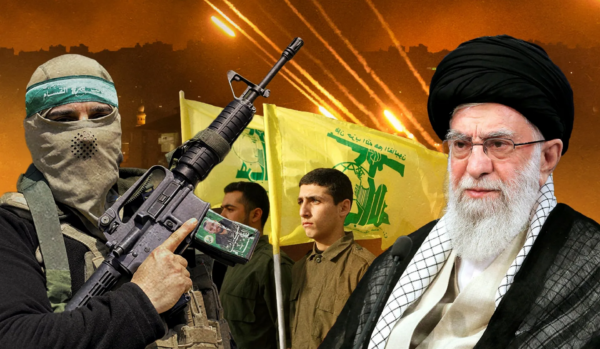Photo: Iran’s Supreme leader Ayatollah Ali Khamanei is shown with Hezbollah and Amal members
By Ali Hussein
For years, Iran has positioned itself as a staunch ally of both Hamas in Gaza and Hezbollah in Lebanon, claiming solidarity with the Palestinian cause and Lebanon’s resistance against Israel. But recent events show that Iran never considered these groups as true allies—only as tools to further its own regional ambitions. Now, the time has come for the Palestinians and Lebanese to recognize this harsh reality.
It’s reported that Iran was behind the planning of the October 7 attack on Israel, which Hamas carried out. But when Hamas leaders turned to Tehran for help after Israel’s retaliation, Iran refused to offer any meaningful assistance. The same pattern was seen with Hezbollah. Iran directed Hezbollah to launch attacks against Israel to ease pressure on Hamas, and Hezbollah, as usual, complied. But when Israel struck back with deadly force, Hezbollah’s leadership sought Iran’s support—again, Iran refused.
If Iran truly cared about Palestine or Lebanon, it would have done what the United States has done for Israel: strengthened the Palestinian territories and Lebanon by building up their armies and investing in their economies. Instead, Iran has done the opposite. It has not spent a penny on infrastructure, education, or any initiative that would genuinely benefit the people of Gaza or Lebanon. Iran’s only investment has been in proxies, using them to expand its influence while neglecting the well-being of those it claims to defend.
Iran’s goal has never been to liberate Palestine or protect Lebanon. Instead, it has sought to weaken these regions, using Hamas and Hezbollah as pawns in a broader geopolitical game. Hamas and Hezbollah have served as bargaining chips for Iran, a means to leverage its power in negotiations with the West. All the while, Iran misled them, creating the illusion that an ill-equipped group of militants could defeat Israel, a state armed with the world’s most advanced military technology and intelligence networks.
The time has come for Palestinians and Lebanese to see the truth: Iran is not their friend, and its loyalty lies only with its own strategic interests. There are many other nations willing to help Palestine and Lebanon build a stable, peaceful future—nations that will not manipulate their struggles for political gain.
Both Palestinians and Lebanese must also acknowledge a fundamental truth: no militia, no matter how well-armed, can replace a legitimate state. And no foreign power, no matter how generous its promises, can be relied upon when the chips are down.
The lesson here is that religious zeal and sectarian loyalty are no substitute for practical governance and peace. The people of Lebanon and Palestine deserve the chance to live in harmony, free from the manipulation of militias that only serve foreign masters.
In fact, while Israel occupies Palestine, Iran has also occupied lands that are not its own: the Greater and Lesser Tunbs and Abu Musa, islands belonging to the United Arab Emirates. Iran’s hypocrisy in claiming to support “liberation” while holding onto occupied territories is glaring.
Finally, both Hamas and Hezbollah must recognize that Iran has not only abandoned them—it has betrayed them. They should swear allegiance to their own nations instead of foreign interests. The Middle East is undergoing profound changes, and the future could be brighter. But only if the region unites to strengthen its states and build sustainable, independent futures.
Iran has already betrayed the leadership of both Hamas and Hezbollah. Reports suggest that Ismail Haniyeh, Hamas’ leader, was killed while staying at an IRGC guest house in Tehran, where an Iranian spy for Israel planted a bomb in his room. Similarly, Hezbollah’s leader, Hassan Nasrallah, met his end after an Iranian agent leaked his location to Israel. Even Ayatollah Khamenei is said to have known about Nasrallah’s imminent assassination but did nothing to warn him.
These betrayals illustrate the depths of Iran’s self-serving agenda. The time has come for Palestinians and Lebanese to break free from this manipulation and look to the future with new partners, committed to peace and prosperity for all.


Leave a Reply
You must be logged in to post a comment.